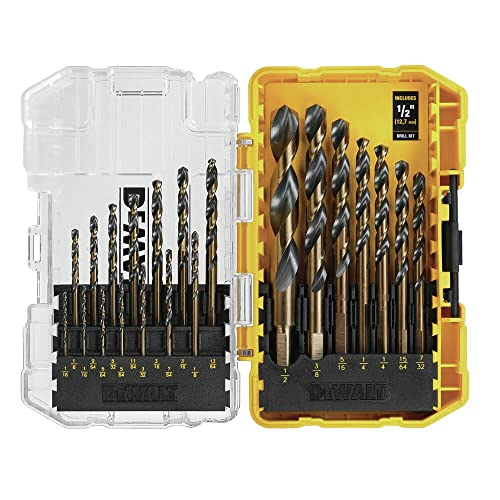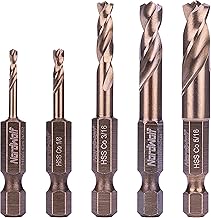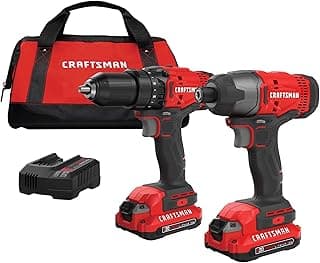When it comes to working with metal, choosing the right tool can make or break your project. But here’s the question—what are the best drills for metal that can handle the heat, pressure, and toughness of different alloys? Whether you’re a professional fabricator or a weekend DIYer, finding the right drill is crucial for clean, accurate results. Now, you might be wondering: should you go for the best drills for stainless steel when tackling tougher jobs, or look for the best drills for hardened steel if you’re working with extremely durable surfaces? Don’t worry—we’ve got you covered. In this guide, we’ll break down the top options, highlight their strengths, and explain what sets them apart. So, ready to find the drill that won’t let you down? Let’s dive in!
Top pick
Best Pilot Point: DEWALT Titanium Nitride Coated Drill Bit Set
The DEWALT Titanium Nitride Coated Drill Bit Set DW1361 is built for cleaner drilling with its Pilot Point tips that start on contact. The titanium nitride coating extends bit life, while the tapered web design reduces breakage. With 21 pieces ranging from 1/16 to 1/2 inch, the set covers most household and workshop needs and comes in a compact plastic tough case.
From a customer and expert perspective, these drill bits perform reliably on wood, plastic, and softer metals, producing smooth holes without wandering. However, they are not intended for heavy-duty use on hardened steel, where cobalt bits perform better.
Overall, the DW1361 set delivers solid performance and good value for general-purpose drilling, making it a dependable choice for DIYers and light professional work.
Best Heavy-duty Torque: Dong Cheng 20V Brushless Heavy-duty Impact Drill
The Dong Cheng 20V Brushless Heavy-duty Impact Drill is engineered for demanding tasks, delivering up to 531 in-lbs of torque with its efficient brushless motor. Its 3-in-1 design combines drilling, screwdriving, and hammering, supported by dual-speed settings up to 2,300 RPM and 34,500 BPM. The 1/2-inch metal ratcheting chuck ensures secure bit retention, while the 20+1+1 clutch settings add precision and prevent overdriving. Weighing just 2.4 lbs without the battery, it remains easy to handle during long jobs thanks to its compact frame and rubberized grip.
From a customer and expert standpoint, this drill performs reliably across wood, metal, and brick applications, with the hammer function adding versatility. The included 2.0Ah batteries are adequate for general use but may feel limiting for extended heavy-duty projects.
Overall, the Dong Cheng 20V impact drill strikes a solid balance of power, control, and portability, offering strong value as an all-around cordless hammer drill for both DIY and professional use.
Best Metric Range: Metric 25Pcs M35 Cobalt Drill Bit Set
The Metric 25Pcs M35 Cobalt Drill Bit Set is designed for versatility and durability, offering sizes from 1.0mm to 13.0mm to cover a wide range of drilling needs. Made from M35 cobalt steel, the bits deliver strong cutting performance on stainless steel, cast iron, copper, aluminum, plastics, and wood. The 135-degree split point tip provides quick starts, prevents walking, and ensures faster chip removal, making the set efficient for both soft and hard materials. A metal index case keeps everything organized and easy to access.
From a user and expert perspective, this set provides solid value for those needing metric precision and durability, especially when working with metals. However, it is not suitable for quenched bolts or extremely hardened alloys, where specialized bits are required.
Overall, the M35 cobalt set is a practical and well-rounded choice, offering long-lasting performance and a comprehensive range of sizes for both workshop and professional applications.

FAQs
What kind of drill will go through metal?
To drill through metal, you’ll need a power drill that offers enough torque and speed control. A corded drill is often preferred for consistent power, especially when working with thicker or hardened steel. However, high-quality cordless drills with a brushless motor can also handle most metal projects effectively. The key is to choose a drill with variable speed settings, since drilling metal requires slower speeds to prevent overheating and bit damage.
What is the best method to drill metal?
The best way to drill metal is to work slowly, steadily, and with proper preparation. Start by marking your drilling spot with a center punch to keep the bit from wandering. Use a sharp metal drill bit and set your drill to a lower speed. Applying steady pressure without forcing the bit is crucial. To reduce friction and heat, always use a cutting fluid or lubricant—this extends the life of your bits and ensures cleaner holes. For thicker materials, step drilling (starting with a smaller pilot hole before moving to a larger size) works best.
What power drill do I need for metal?
When drilling metal, you should look for a drill that has at least 18V (for cordless) or a robust corded option with around 6–8 amps. A drill with variable speed control is essential since different metals require different RPMs. For example, stainless steel demands slower speeds compared to softer metals like aluminum. A hammer drill isn’t necessary for metal; in fact, the hammer function should be avoided, as it can damage bits and workpieces. A regular power drill with good torque is all you need.
What type of bit is best for metal?
The type of drill bit you use makes the biggest difference. For general metal drilling, High-Speed Steel (HSS) bits work fine. If you’re working with tougher metals like stainless steel or hardened steel, cobalt bits (M35 or M42) are the top choice thanks to their heat resistance and durability. Titanium-coated bits are also effective, but the coating wears off over time. For thin sheet metal, step bits can be extremely efficient because they create clean holes without grabbing or tearing the material.
Conclusion
Choosing the best drills for metal comes down to matching the right tool and bit with the material you’re working on. A dependable power drill with variable speed control provides the foundation, while the correct bit—whether cobalt, titanium-coated, or step bits—ensures precision and durability. Technique also matters: drilling at a controlled pace, using lubrication, and starting with a pilot hole can make the process smoother and extend the life of your equipment. In the end, investing in quality drills and using proper methods will save time, reduce frustration, and deliver cleaner results when working with any type of metal.





















